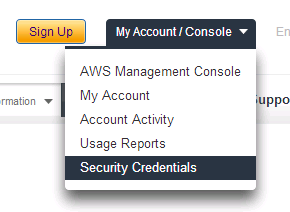It's been a few weeks since my last post about
putting data into Amazon S3, and in it, I mentioned that you could use it to store keyword performance reports for multiple AdWords Accounts in a single place. Here is an updated version which does exactly that. It combines my previous post about storing
AdWords Account Performance Report in a Google Spreadsheet (with some changes of course).
Also, with this post, I will start versioning all of my scripts so that you can be sure you always have the latest version.
Thanks,
Russ
//-----------------------------------
// Store Keyword Performance Report in Amazon S3
// Created By: Russ Savage
// Version: 1.0
// FreeAdWordsScripts.com
//-----------------------------------
var ACCESS_KEY = 'YOUR_ACCESS_KEY_HERE';
var SECRET_KEY = 'YOUR_SECRET_KEY_HERE';
var S3_BUCKET = 'YOUR_S3_BUCKET_NAME_HERE';
function main() {
var date_str = Utilities.formatDate(new Date(),AdWordsApp.currentAccount().getTimeZone(),'yyyy-MM-dd');
var file_name = 'adwords_keyword_perf_'+AdWordsApp.currentAccount().getCustomerId() + '_' + date_str+'.csv';
putDataToBucket(S3_BUCKET,'/'+file_name,getKeywordPerformanceReport());
}
function putDataToBucket(bucket,file_path,data) {
var auth_options = {
method : 'PUT',
base_url : "http://" + bucket + ".s3.amazonaws.com",
s3_bucket : bucket,
path : file_path,
headers : {
"Date" : getDate(),
"Content-Type" : "application/x-www-form-urlencoded"
},
};
var auth_string = generateAuthString(auth_options);
auth_options.headers["Authorization"] = auth_string;
var options = {
method : auth_options.method,
headers : auth_options.headers,
payload : data
};
return (UrlFetchApp.fetch(auth_options.base_url+auth_options.path, options).getResponseCode() == 200);
}
function generateAuthString(url) {
var string_to_sign = getStringToSign(url);
Logger.log(string_to_sign);
var signature = getSignature(SECRET_KEY,string_to_sign);
return "AWS" + " " + ACCESS_KEY + ":" + signature;
}
function getSignature(SECRET_KEY,string_to_sign) {
return Utilities.base64Encode(
Utilities.computeHmacSignature(
Utilities.MacAlgorithm.HMAC_SHA_1,
string_to_sign,
SECRET_KEY,
Utilities.Charset.UTF_8
)
);
}
function getStringToSign(url,params) {
var method = url.method;
var date = url.headers.Date;
return method + "\n" + "\n" +
url.headers['Content-Type'] + "\n" +
date + "\n" +
getCanonicalizedAmzHeaders(url);
}
function getCanonicalizedAmzHeaders(url) {
var ret_val = "/" + url.s3_bucket;
ret_val += url.path;
return ret_val;
}
function getDate() {
return Utilities.formatDate(new Date(),"GMT", "EEE, dd MMM yyyy HH:mm:ss +0000");
}
function getKeywordPerformanceReport() {
var date_range = 'LAST_7_DAYS';
var columns = ['Date',
'CampaignName',
'CampaignStatus',
'AdGroupName',
'AdGroupStatus',
'IsNegative',
'Id',
'KeywordMatchType',
'KeywordText',
'DestinationUrl',
'FirstPageCpc',
'MaxCpc',
'MaxCpm',
'PercentCpa',
'ClickType',
'Device',
'Slot',
'CpcBidSource',
'AverageCpc',
'AverageCpm',
'AveragePosition',
'PreferredPosition',
'QualityScore',
'Clicks',
'ConversionRate',
'ConversionRateManyPerClick',
'Conversions',
'ConversionsManyPerClick',
'ConversionValue',
'Cost',
'CostPerConversion',
'CostPerConversionManyPerClick',
'Ctr',
'Impressions',
'Cost',
'ValuePerConversion',
'ValuePerConversionManyPerClick',
'ViewThroughConversions'];
var columns_str = columns.join(',') + " ";
var report_iter = AdWordsApp.report(
'SELECT ' + columns_str +
'FROM KEYWORDS_PERFORMANCE_REPORT ' +
'DURING ' + date_range, {
includeZeroImpressions: false,
apiVersion: 'v201302'
}).rows();
var ret_data = '"' + columns.join('","') + '"\n';
while(report_iter.hasNext()) {
var row = report_iter.next();
var row_array = [];
for(var i in columns) {
row_array.push(row[columns[i]]);
}
ret_data += '"' + row_array.join('","') + '"\n';
}
return ret_data;
}

